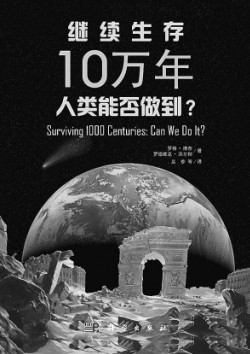Surviving 1000 Centuries: Can we do it, written by astrophysicists Roger Bonnet and L. Woltjer, which is translated by Wu Ji, Director of NSSC and other Chinese scientists, is greeted by the Chinese Readers with immense enthusiasm.
It is reviewed by Song Jian, Academician and former state councilor, Xu Guanhua, Academician and former Minister of Ministry of Science and Technology, Wang Liheng and Wang Xiji, Academicians from China Aerospace Science and Technology Corporation etc. The following is the book review by Wang Xiji.
Book Review of Surviving 1000 Centuries: Can we do it?
By Academician WANG Xiji
In recent years, the issue of environment and survivability, as shown in topics like climate change and resources exhaustion, has popped into the horizon of the governments and the general public from scientists’ reports. Currently, every country is paying more heed on the development of their own country or a specific region and it seems there is a long way ahead to reach a consensus and take concerted action on the issue of global environment and survivability. The question is: If the current lifestyle and development trend for humanare not reversed, will the Earth still have the capacity to harbor life and be able to suffer from the enormous supernatural influence human beings imposed upon it? In other words, how long could human being survive on the Earth which is the only recorded planet with the confirmed existence of life? Do we have enough time left? Could the Earth become a silent body like the moon? Could the human beings immigrate to other planets? With a rigorous attitude, the authors of Surviving 1000 Centuries: Can we do it made an in depth assessment of the status quo of the Planet Earth and predicted the future of Earth. This book, as a scientific work, will elaborate on these issues.
Roger Bonnet and L. Woltjer, the authors of the book, are well-known astrophysicists, but at the same time, they are outstanding administrators. The authors, based on a large body of scientific data, following the scientific rational line of reasoning, analyzed the path for future sustainable development and gave “exactly-to-the-point” advices and suggestions. Thanks to Prof. Wu Ji, Director General of National Space Science Center, and other scientists who translated the book into Chinese, the Chinese version of Surviving 1000 Centuries: Can we do itcould come out in such a short time, making the book available very soon to the general readers.
Taking the history of the Earth and the history of human evolution as the point of departure, the authors made in depth analysis of the threats, challenges and dangers for development, analyzed the key resources issues such as energy, minerals, water and food, stressed the importance of active management of these resources, specified crucial role space science and technology should play in assessing the evolution of the Earth environment and in global decision making, pointed that “China in particular with its successful and impressive space program will be a key partner in that global international effort”, and reiterated the need for the framework global of governance and global solutions.
The authors confirmed the contributions of China as a responsible country in safeguarding Earth Spaceship: “The successful limitation of the growth of the population is the precondition for creating and maintaining a livable society”.
For the long-term survival of humanity, the authors show an optimistic rather than pessimistic tone. But they stressed that the problem is not so much the long-time future, but the transition phase from our present state to our distant future. The planning for the 21st century is especially important. The book conveys the message that strictly limiting the population, making reasonable plan for energy resources and curbing global warming are of critical importance to long-term survival.
This book is not scientific conjecture but rational thinking and rigorous reasoning based on scientific data, informing the politicians all around the world about the responsibilities and measures for carrying out global collaborative management. China, amid rapid development, needs to work out, from a global perspective, the track for future development. I believe that after reading the book, the Chinese policy makers, development strategy planners and other relevant people will feel rewarded.

(Translated and Supplied by Office of International Cooperation, NSSC)


